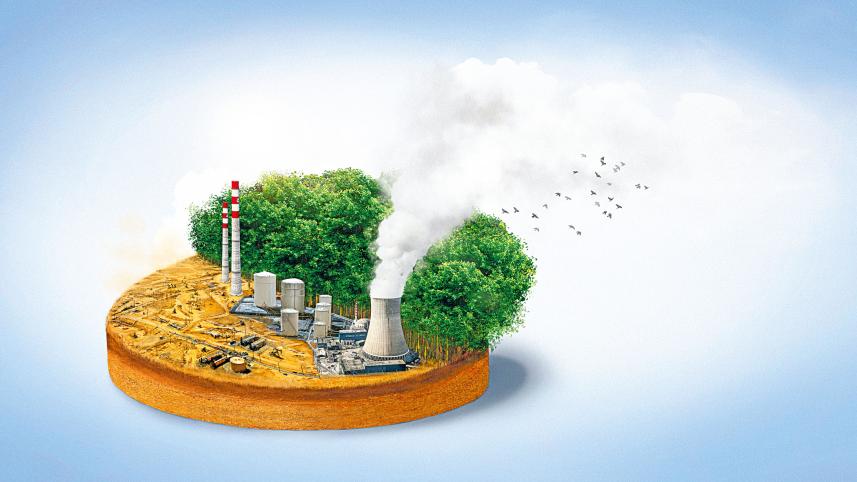Raise emission cut targets to match renewable goals: CPD

Bangladesh should raise its greenhouse gas reduction targets for 2030 in line with the government's new renewable energy ambitions, the Centre for Policy Dialogue (CPD) said yesterday.
The country is set to submit its revised Nationally Determined Contributions (NDC) to the United Nations Framework Convention on Climate Change (UNFCCC) next month.
In its last NDC in 2021, Bangladesh pledged to cut emissions equivalent to 43.72 million tonnes of carbon dioxide (MtCO2e) from the power sector, nearly half the overall target.
CPD now recommends increasing that to 76.96 MtCO2e by 2030, including 19.24 MtCO2e of unconditional cuts.
The findings were presented by CPD Senior Research Associate Helen Mashiyat Preoty and Programme Associate Mehadi Hasan Shamim at a discussion titled "NDC 3.0 for the Power Sector: Is Bangladesh Setting Ambitious Targets?" held at the Brac Centre Inn in Dhaka.
The think tank proposed setting targets of 91.24 MtCO2e for 2035 and 103.34 MtCO2e for 2040, aligned with the government's renewable energy roadmap.
In June, the government set fresh goals to source 20 percent of electricity from renewables by 2030 and 30 percent by 2040.
"Our main challenge is monitoring implementation. We prepare documents, but due to a lack of manpower and other issues, the monitoring is limited," said Fahmida Khanom, additional secretary at the environment ministry
According to CPD estimates, Bangladesh would need 4,540 megawatts (MW) of power from renewable sources by 2030, 6,438 MW by 2035, and 8,928 MW by 2040. This would require 18,162 MW of renewable capacity by 2030, rising to 25,751 MW by 2035 and 35,713 MW by 2040, alongside a phase-out of fossil fuels.
The transition would demand investments of about $12.6 billion by 2030, $12.1 billion by 2035, and $10.5 billion by 2040.
Fahmida Khanom, additional secretary at the Ministry of Environment, Forest and Climate Change, said interministerial consultations would be completed within two weeks to finalise the NDC 2025.
"Our main challenge is monitoring implementation. We prepare documents, but due to lack of manpower and other issues, the monitoring is limited. We are trying to resolve this," she noted.
Mirza Shawkat Ali, director of Climate Change and International Convention at the Department of Environment, said the draft of the new NDC targets, covering the period up to 2035, is in its final stage.
He noted that while most unconditional commitments in the 2021 NDC had been met, progress on conditional targets was "very low" due to unfulfilled donor funding. "The failure of conditional commitments is not our liability."
Jarifa Khatun, director of IPP Cell-3 at the Bangladesh Power Development Board, said several renewable projects are being funded by government agencies themselves, while new solar tenders are expected to be awarded soon.
"All these issues are being shared with the Department of Environment, which will reflect them in the NDC," she added.
Imran Karim, former president of the Bangladesh Independent Power Producers' Association, said the sector must restore investor confidence first.
He pointed out that only 55 investors had participated in 40 renewable tenders during the interim government.
"It is due to the lack of implementation agreements, which previously guaranteed payments. Investors are dealing with a company [Power Development Board] that cannot repay them on time," he said, urging quick resolution of tenders.
Md Shafiqul Islam, professor of nuclear engineering at Dhaka University, observed that nuclear plants emit the lowest levels of greenhouse gases among all types of power generation, yet remain absent from discussions.
Shaikh Muhammad Mehedi Ahsan, assistant professor at Independent University, Bangladesh, said reducing emissions was essential for the country itself, not just to meet international obligations.
"Some two lakh people die every year in Bangladesh due to air pollution. Many government agencies bypass environmental rules while implementing development projects," he said.
The session was moderated by CPD Research Director Khondaker Golam Moazzem, while Chairman of Power Grid Bangladesh PLC Prof M Rezwan Khan, former Research Director at Bangladesh Institute of Development Studies Asaduzzaman, and former BUET dean Prof Ijaz Hossain spoke, among others.



 For all latest news, follow The Daily Star's Google News channel.
For all latest news, follow The Daily Star's Google News channel.